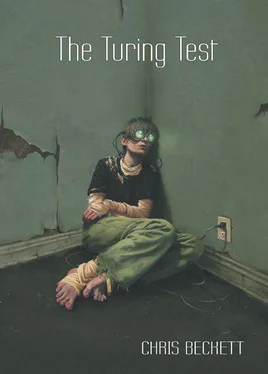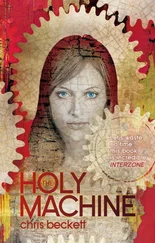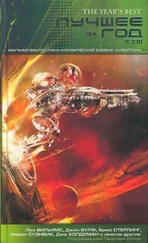“You’re so very nice dear. It’s such a pity that you’re not really here.”
Usually she found herself alone in a kind of lacuna, with people moving aside to pass her by at a safe distance. And in these situations she would often become distressed and start to rant and shout:
“You’re not real you know! You’re just bits of nervous tissue plugged into a computer! You’re far away from here, suspended in jars of nutrients, and the computer is sending you pictures of the real London with all this consensual nonsense superimposed on top of it!”
Terence used to talk like that a lot when he was alive, as haughty old physicals tended to do, but in those days Clarissa always used to criticise him for it:
“Who’s to say our world is more real than theirs?” I remember her demanding of him at one of the physical community’s periodic gatherings, the two of them on opposite sides of a large dining table laden with silver and fine china and cut glass.
Terence declined to answer. Everyone in the room was willing Clarissa to shut up and let us return to our customary state of numbness.
“Come on Terence, who’s to say?” she insisted. “At least consensuals engage with life and with one another.”
She glared up and down the table.
“And what do you think would be left of us if we stripped away everything that had come from outside ourselves, everything that other people had made? We’d be naked. We’d be gibbering imbeciles. Think about it. Even when we talk to ourselves inside our own heads, we use words that other people gave us.”
But that was then. Now it seemed that Terence had been speaking all along on behalf of another side of Clarissa’s own self.
“Don’t look at me like that!” she’d scold the consensuals when they pointed and laughed at her, “You sold your true bodies for the illusion of youth and plenty, but I am real!”
Sometimes, in the middle of one of these rants, she would defiantly turn off her Field implant, making the people and the traffic disappear from her view, houses become empty shells again and all the shop windows with their cheerful displays turn back into hollow caves:
“I can’t even see you, you know!” she shouted, knowing that the consensuals could nevertheless still see her, for sensors across the city pick up the sights and sounds and textures of everything physical and this becomes the matrix within which the consensual city is built. They had no choice but to see her. “I’m in the real world and I can’t see you at all. That’s how unreal you are. I can turn you off with a flick of a switch.”
But though she might like telling the consensuals they didn’t really exist, their opinion mattered to her desperately and she couldn’t resist turning the implant on again to see what impact she was having. (I’ve never known anyone who turned an implant on and off as often as Clarissa did.) Almost invariably they would all be carefully ignoring her.
It was in these moments, when she had thrown a tantrum and discovered that no one was impressed, that things could get out of control. Once, a month or so before her trip to Piccadilly Circus, she found she could get no one to pay attention to her in the streets outside Walthamstow underground station. Rather than admit defeat, she insisted instead on going right down the stairs, arthritic and unsteady as she was, and waiting on the Southbound platform for a train. The platform emptied around her as the consensuals crowded up to the other end.
And then when the train came in, she promptly tried to step onto it. Of course she fell straight through onto the track, it being a virtual train, part of the Field, which couldn’t bear physical weight, only the notional weight of consensual projections. She broke a small bone in her ankle. It hurt a great deal and she began to hobble up and down calling out for someone to help her up. The rules under which the Field operated meant that the train could not move off with her there. Yet she herself was breaking those rules. To the consternation of the passengers she appeared to them to be wading waist deep through the solid floor of the train, looking up at their averted faces accusingly and haranguing them for their lack of compassion:
“Isn’t there a single soul left in London prepared to help an old woman? Have you all lost your hearts as well as your bodies?”
Broken bones – and physical injuries in general – were completely outside their experience, so they would have had some excuse for not empathising with her plight, but actually they would have liked to help her, if not out of pure altruism, then out of self-interest. For she was holding up the train – not to mention the other trains behind it – and she was distressing everyone. Consensuals, unless they are destitute, are uniformly beautiful and, although they die at last, they don’t age in the way we do. Spit never flies from their mouth. Snot never runs from their noses. Their make-up doesn’t smudge. It must have been truly horrific to see this dreadful wrinkled smeary creature wading up and down among them with its head at knee-height, like some kind of goblin out of a fairy tale. But what could they do? They couldn’t lift Clarissa back onto the platform with their consensual hands and arms, any more than the train could hold her up with its consensual floor.
So someone called the Hub, and the Hub put the word out to us in the physical community that one of our people was in difficulties and did we want to deal with it or should Agents be sent in?
Phone calls went to and fro. The physicals of London are like the members of some old dysfunctional family who have seen right through each other’s limited charms, know every one of each other’s dreary frailties, but who are somehow chained together in misery.
“Bloody Clarissa. Have you heard?”
“Clarissa’s up to her tricks again.”
“Obviously we can’t let Agents in. The real people have to deal with their own.”
“Bloody Clarissa. How dare she put us in this position?”
In the end I was delegated to go up there with Richard Howard to sort it out. We travelled right across London and, since of course we couldn’t use the virtual escalators, climbed slowly and stiffly as Clarissa had done, down the deep concrete staircase into the station. Clarissa was still stuck on the track. She had turned off her implant again, partly out of defiance, partly to avoid being overwhelmed by the agitated consensuals around her. But as a result she had lost the lights that the Field superimposed on the deserted and unlit physical station. For the last hour she had been stumbling around crying and wailing in pitch darkness with nothing for company except rats, and no sound at all except the drip, drip of water from somewhere down the southbound tunnel.
Richard and I had our implants switched on so as to be able to see what we were doing, and so had to endure the cold gaze of the consensuals. They sat in the train watching as we clumsily extracted Clarissa from the floor; they stood on the platform watching as we dusted her down; they craned round on the virtual escalators to watch us half-carry her up the concrete steps.
“Look at those spooks!” someone in the street said, quite loudly, as Richard and I helped Clarissa into Richard’s truck. “Look at the ugly faces on them! Haven’t they got any self-respect?”
And there was a general hum of agreement. As a rule consensuals are scared of us Outsiders and our uncanny powers over the physical world. (Richard in particular is an object of awe, with his immense height, his great mane of white hair, and his tendency to walk contemptuously through virtual walls.) But we couldn’t have looked very scary just then: two breathless old men, flushed and sweaty, helping a batty old woman with an injured foot into an ancient truck.
Читать дальше











